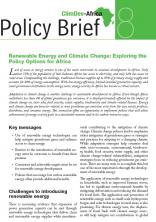Policy Brief 8 : Renewable Energy and Climate Change: Exploring the Policy Options for Africa

Lack of access to energy services is one of the main constraints to economic development in Africa. Only about 31% of the population of Sub-Saharan Africa has access to electricity, and only 14% has access in rural areas. Compounding the challenge, traditional biomass supplies up to 85% of primary energy supply and accounts for 80% of energy consumption. With low energy efficiency, limited installed generation capacity, and weak governance institutions in the energy sector, energy security in Africa has become a critical concern.
Adaptation to climate change is another challenge to sustainable development in Africa. Even though Africa contributes less than 4% of global greenhouse gas emissions, it is disproportionately affected by the impact of climate change on, inter alia, food security, water supplies, biodiversity and climate-related diseases. Energy and climate change are however related, as most greenhouse gas emissions arise from the way society produces,distributes, and consumes energy. This connection offers an opportunity to implement policies that will allow achievement of energy security goals in a sustainable manner and in less carbon-intensive ways.